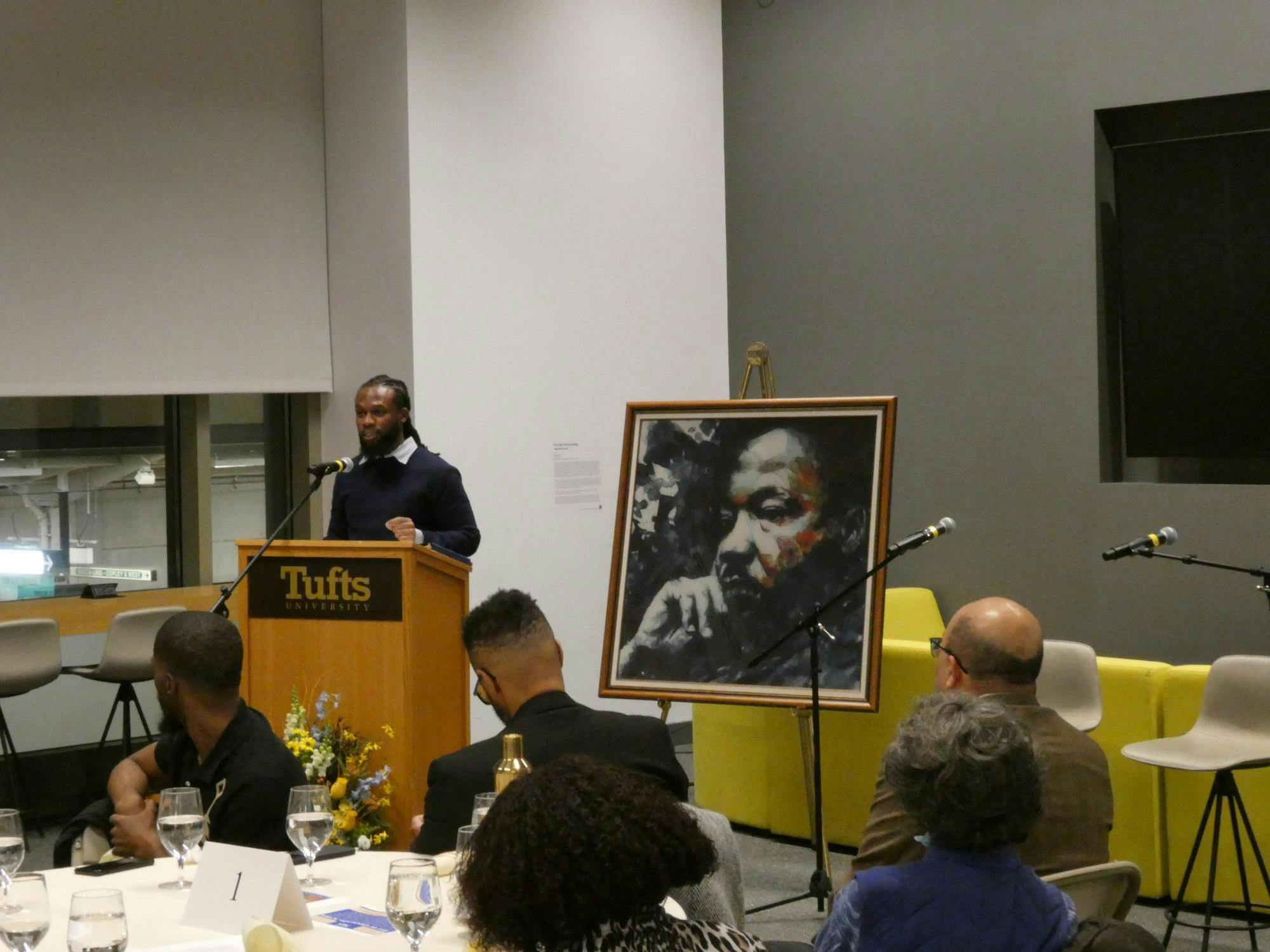The university held its annual Rev. Dr. Martin Luther King Jr. celebration in the Joyce Cummings Center on Jan. 31, featuring keynote speaker Christian Walkes, who studies race and inequality within the U.S. education system as a PhD student at Harvard’s Graduate School of Education. The event centered around the theme of a “single garment of destiny,” a concept first described by King in his 1963 “Letter from Birmingham Jail,” highlighting the shared nature of the future.
“It goes back to this idea that I speak about: shared vulnerability,” Walkes said in an interview. “This idea that, and even in King’s work, that what happens to someone else — even if it’s a distance away — it impacts us in some way. Whether we gain from it, whether we feel the same pain that that person felt, we’re all connected and everyone’s life is tied together even until this day.”
The Africana Center, University Chaplaincy, Jonathan M. Tisch College of Civic Life, Office of the Vice Provost for Institutional Inclusive Excellence and Office of the President also honored the winners of the MLK Student Voices Award, which asked students to reflect on how the sentiments expressed by King in his letter are “alive on our Tufts campuses today.”
“The letter is particularly important, because it speaks to what people go through when they’re trying to fight for justice. … That living document speaks to his resolve, to be within that jail and still pen this letter that is really timeless in many ways,” Walkes said. “People can pick it up at really any moment in history, and take something from it.”
Facilitators were also present at each dinner table, helping to spark conversation about King’s work and how it can apply to communities at Tufts and elsewhere.
The two winners of the MLK Student Voices Award, Alpha Massquoi and Tatum Schutt, then spoke on their submissions for the annually presented award. Massaquoi — a second-year master’s student at the School of the Museum of Fine Arts — is originally from West Africa and moved to the U.S. with his family during the 2008 recession, but not before living through a war during his youth. His personal history, he said, inspired his submission for the award.
“My entire journey has been of pressure, because what is expected from me is to be in prison, especially with my background of trauma,” Massaquoi said in an interview with the Daily. “But instead, I’ve grown into something better: I’m here at Tufts, getting my master’s.”
Massaquoi’s submission was a charcoal drawing titled “Season Change,” depicting a Black woman gazing out at the viewer, which comments on the marginalization of Black people.
“For a bit too long, Black joy and Black beauty have been placed in the background by society as an ambient noise meant to be forgotten,” a speaker read from Massaquoi’s artist statement. “We are often reminded of our plight and struggles to be seen as humans and nothing less. This body of work is a celebration of Black beauty.”
While Massaquoi’s submission does include colorful accents, he said that his decision to work in charcoal was intentional.
“My work is primarily portraits because I love people. I love our people,” Massaquoi said. “I am a trained painter, but I work in charcoal because charcoal is a medium that didn’t seem as important. But if you put coal under pressure it turns into diamond, so I think for me as a Black person, if you put me under pressure, I’m going to become a diamond.”
Tatum Schutt, a senior studying race, colonialism and diaspora at Tufts, won for her essay focusing on “inescapable mutuality,” which “skillfully dances between personal history, origin stories and mistakes of solidarity,” according to the same announcer. In her speech, Schutt focused most heavily on the ongoing conflict in the Middle East.
“How do we talk about violence today?” Schutt asked. “I sit in class. Students receive disciplinary infractions for protesting, and I win a prize. How do we not talk about violence today? The piece I wrote … is a reaching to you, to all of us, through myself, as a settler, as a Jew without [a] homeland. It’s an insistence that we witness, hold and respond to the parts of ourselves, our communities, our institutions that are bound up in the suffering and resistance around us.”
Schutt said that she will be donating her award funds to Palestine Legal, “which protects the civil and constitutional rights of people in the United States, [of] students, like me, who speak out for freedom as Dr. King did, and does through his words, and through the work and love they inspire in us.”
The event also included performances by the student a cappella groups S-Factor and Ladies of Essence.
“I think the main thing to take away is that King was in a particular moment in time, but it’s important for us to recognize that we have our own moment,” Walkes said. “There is organizing taking place for Palestine, there’s people organizing for Black Lives Matter, and so we’re really inheriting a rich tradition here. And it’s important that yes, King was back then, but we are also changemakers and we should see ourselves as history makers.”
Editor’s note: The article has been updated to reflect that the Office of the President also organized the event. Additionally, the previous version misstated the theme of Schutt‘s essay: It is “inescapable mutuality,” not “escapable mutuality.” The previous version also misstated Schutt's class year: She is a senior, not a junior.






